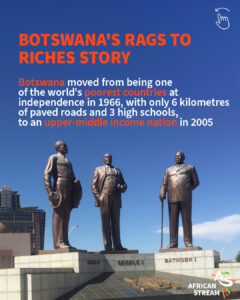
Hundreds of thousands of people in Botswana headed to the polls today, 30 October, to vote in the southern African country’s general elections.
According to Botswana’s electoral body, more than 1 million people are eligible to vote.
Incumbent President Mokgweetsi Masisi, 63, seeks a second five-year term to extend the ruling Botswana Democratic Party (BDP) ‘s 58-year rule.
He is squaring off with three challengers, including longtime opposition leader Duma Boko of the Umbrella for Democratic Change (UDC), Dumelang Saleshando of the Botswana Congress Party and Mephato Reatile from the Botswana Patriotic Front.
Masisi and his party are widely expected to carry the day, mainly due to a divided opposition and BDP’s legacy of turning around Botswana’s economic fortunes from an impoverished country at independence in 1966 to an upper-middle income country by 2005.
While there is no doubt that the discovery of massive diamond deposits in the 1960s was a game changer, many believe that Botswana insisting on holding a stake in the diamond industry, instead of watching from the sidelines, helped it forge a successful economic path.
In 1969, the government of Botswana set up Debswana, a 15-85 mining joint venture with diamond miner De Beers, which had secured the prospecting and mining rights to the country’s diamonds. In 1975, Botswana’s share in Debswana was increased to 50 per cent.
Today, Debswana is the world’s largest diamond firm by value, helping Botswana become the second-largest producer of the precious stones after Russia.
The revenue from diamond production enabled the country to embark on an ambitious development programme in the 1970s that built thousands of schools, hospitals and other social infrastructure projects. It has also enabled the country to provide universal health coverage to all citizens, helping to raise the life expectancy from 51 years in 1966 to 70 years in 2024. The first 10 years of schooling are also free of charge.
These moves propelled Botswana to become one of the continent’s most developed and second-least corrupt.
However, in recent years, economic growth has stagnated due to a significant downturn in the global diamond market. On 28 October, Botswana’s central bank reported that Debswana’s diamond sales dropped by more than 50 per cent between January and September 2024, partially attributed to the rising popularity of lab-grown artificial diamonds.
Declining diamond revenue has slowed the economy, struggling to provide enough jobs for the growing population and leading to discontent among citizens, especially youths. However, the ruling party may be relying on the glory of yesteryears to convince citizens to grant it another five-year mandate.
Sources:
https://futures.issafrica.org/geographic/countries/botswana/https://www.transparency.org/en/cpi/2023
https://www.imf.org/external/datamapper/NGDPDPC@WEO/WEOWORLD/GHA/ZAF/SLE/BWA
https://mpra.ub.uni-muenchen.de/115608/1/MPRA_paper_115608.pdf
https://www.macrotrends.net/global-metrics/countries/BWA/botswana/life-expectancy
https://www.mmegi.bw/news/gruesome-unemployment-engulfs-287000-batswana/news
https://www.debeersgroup.com/reports/socio-economic-impacts/botswana/building-on-diamonds
https://www.scholaro.com/db/countries/botswana/Education-System
https://www.unicef.org/esa/media/2471/file/UNICEF-Botswana-2018-Education-Budget-Brief.pdf
https://www.theguardian.com/world/2002/jul/08/aids
https://www.imf.org/external/datamapper/NGDPDPC@WEO/WEOWORLD/GHA/ZAF/SLE/BWA
https://4cs.gia.edu/en-us/blog/botswana-diamonds
https://www.macrotrends.net/global-metrics/countries/BWA/botswana/life-expectancy
https://english.news.cn/africa/20240822/fda6c0c4391d4bfeb9f035ddefb00183/c.html








